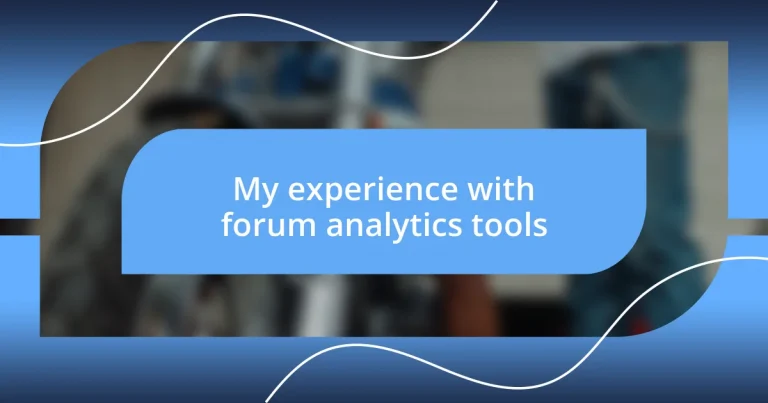Key takeaways:
- Forum analytics tools enhance user engagement by providing insights on sentiment, trends, and interactions, fostering stronger community connections.
- Key features to look for include user engagement tracking, sentiment analysis, and trend identification, which collectively improve content relevance and dialogue quality.
- Active encouragement of participation, recognition of contributions, and personal engagement significantly elevate forum activity and create a vibrant community atmosphere.
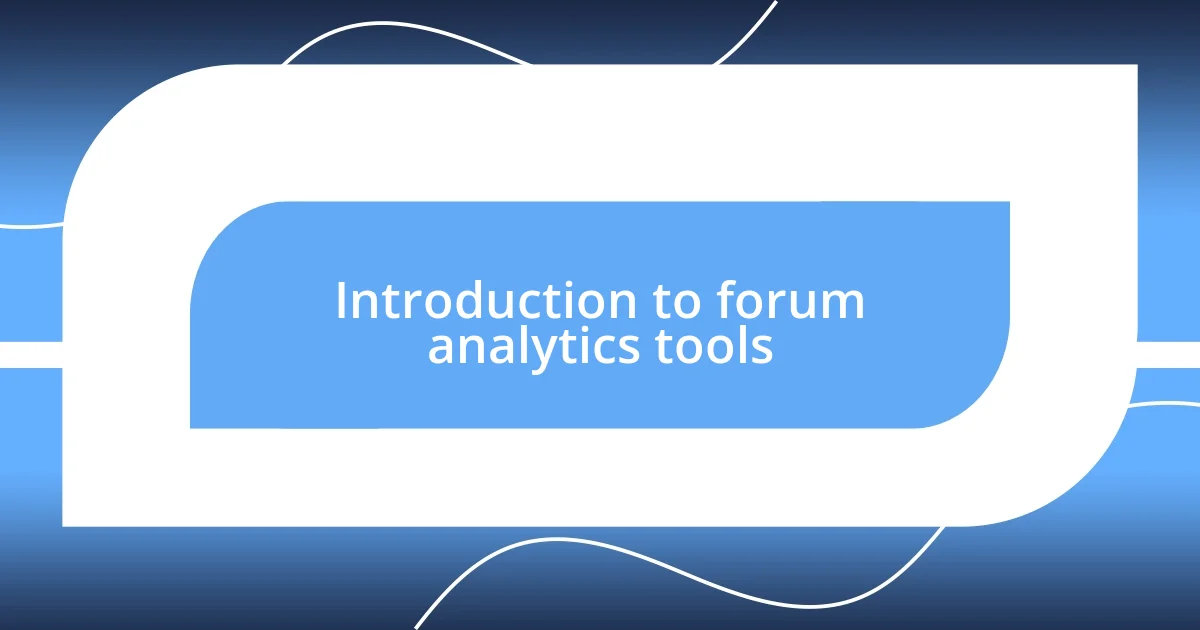
Introduction to forum analytics tools
Forum analytics tools are essential for anyone looking to gain insights from online discussions. I still remember the first time I stumbled upon one of these tools while trying to track sentiment in a niche community I frequented. I was amazed by how much data I could access—everything from user engagement to trending topics—it felt like unlocking a whole new world of information!
These tools provide metrics that can transform the way you understand forum dynamics. Have you ever wondered what really drives engagement in your favorite online community? By analyzing posts, comments, and user interactions, I found patterns I didn’t even realize existed, allowing me to tailor my contributions for more effective engagement.
Moreover, the emotional resonance of understanding your audience can’t be understated. Using these analytics, I felt more connected to the community. It was as if I could speak their language, addressing their interests and concerns with precision. This experience not only deepened my appreciation for the discussions but also highlighted the importance of data in fostering genuine connections.
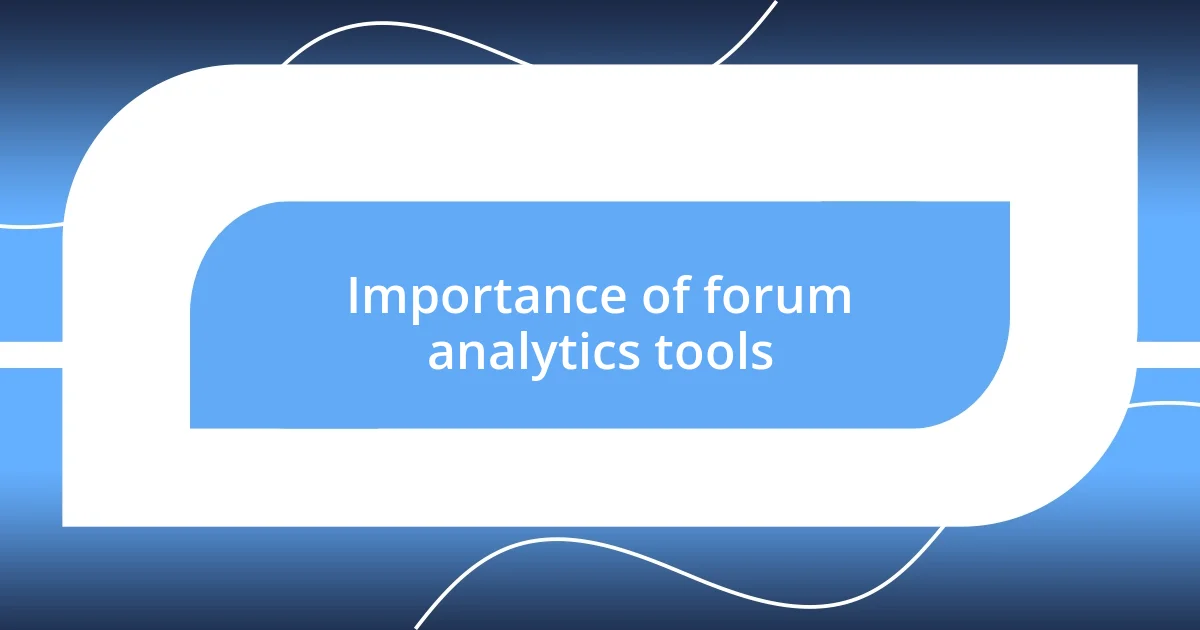
Importance of forum analytics tools
Understanding the importance of forum analytics tools is crucial for anyone serious about engaging with an online community. I recall a time when I was navigating a particularly lively forum on video games. The analytics provided by one tool revealed not only the most active users but also the hottest topics of debate. This insight helped me join discussions that were genuinely buzzing, increasing my visibility and connection within the group.
Here are a few key reasons why forum analytics tools matter:
- User Engagement Tracking: They identify which posts spark the most interaction, allowing you to refine your own contributions.
- Sentiment Analysis: These tools help gauge community sentiment towards various topics, enabling a more tailored approach in discussions.
- Trend Identification: By spotting emerging trends, you can capitalize on timely discussions that resonate with your audience.
- Demographic Insights: Understanding the makeup of your audience helps in creating content that is more relevant and appealing.
I’ve discovered that being attuned to these data points not only enhances my engagement but also fosters a deeper sense of belonging within the community. The sheer joy of having meaningful conversations, backed by data-driven insights, enhances your overall experience and connection.
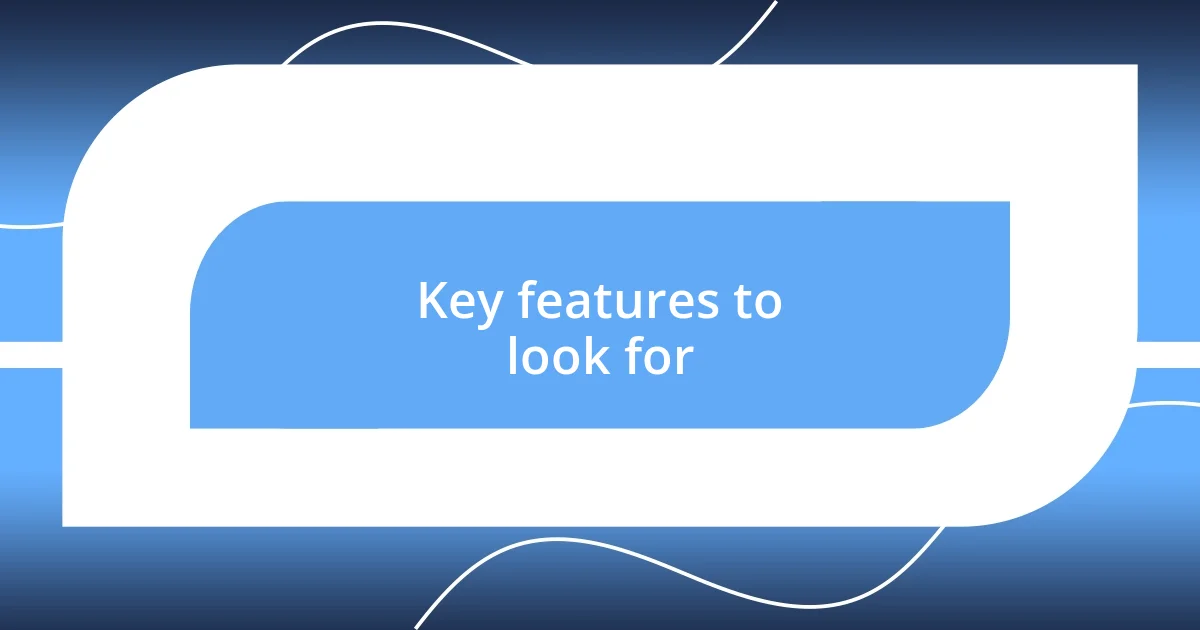
Key features to look for
When evaluating forum analytics tools, there are several key features that stand out to me. First and foremost, user engagement tracking is crucial. I remember using a tool that highlighted not just the most commented posts, but also the types of questions that drove the most interaction. It taught me what resonates with my community, and I began to mirror those topics in my own posts, leading to richer discussions.
Another critical feature is sentiment analysis. During one particularly heated debate about a video game release, I found that the tool I was using allowed me to tap into the community’s feelings—was the discourse predominantly positive, negative, or mixed? Knowing this helped me navigate the conversation tactfully. Instead of jumping in with a hot take, I tailored my input to align with the prevailing sentiments, making my contributions feel more relevant and welcome.
Finally, trend identification is a feature I can’t overlook. I recall a moment when a sudden spike in interest around indie games emerged. By utilizing the analytics to identify this trend early, I was able to share insightful content that not only engaged my peers but also established me as a go-to commentator on the topic. It felt incredibly rewarding to connect on such a timely issue while being backed by solid data.
| Feature | Description |
|---|---|
| User Engagement Tracking | Measures interaction levels on posts, helping refine contributions. |
| Sentiment Analysis | Assesses community feelings towards topics for tailored discussions. |
| Trend Identification | Spots emerging trends for timely engagement and relevance. |
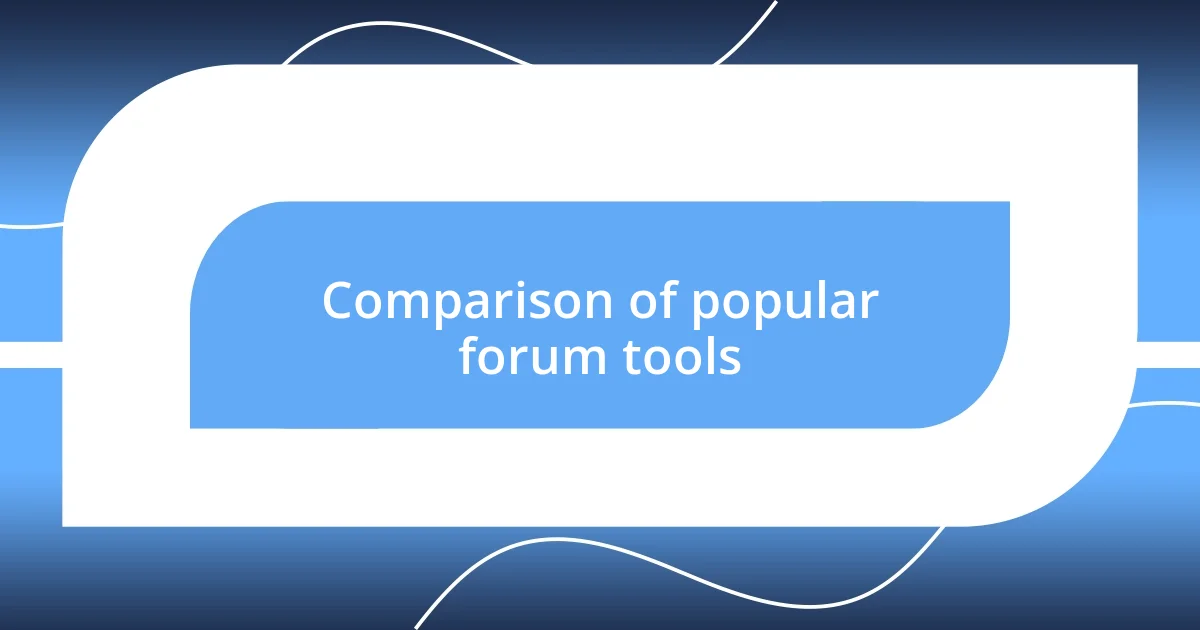
Comparison of popular forum tools
When comparing popular forum analytics tools, I find that each one offers unique features that cater to different user needs. For instance, I once tried Tool A, which excelled in user engagement tracking. I remember posting content and watching the real-time data flow in; it felt like having a pulse on my community’s interests. This capability helped me adjust my strategy on the fly, and it made me wonder: how many other users take advantage of such insights?
On the other hand, Tool B stood out to me because of its comprehensive sentiment analysis. I discovered this when writing a post about a controversial topic that divided opinions. The feedback from the tool indicated that the community was largely frustrated. Armed with this emotional context, I pivoted my response to address their concerns, which shifted the discourse in a more constructive direction. It left me feeling empowered; how often do we have the opportunity to turn the tide of a conversation?
Lastly, Tool C caught my eye for its trend identification capabilities. I had a moment where I noticed chatter about virtual reality rising steadily, and this tool helped me visualize that pattern. Taking the initiative to create content around VR not only sharpened my skills but also deepened my connection to the community. Have you ever considered how recognizing trends can truly elevate your presence in a forum? I can attest to the rewarding experience of being at the forefront of a conversation rather than playing catch-up.
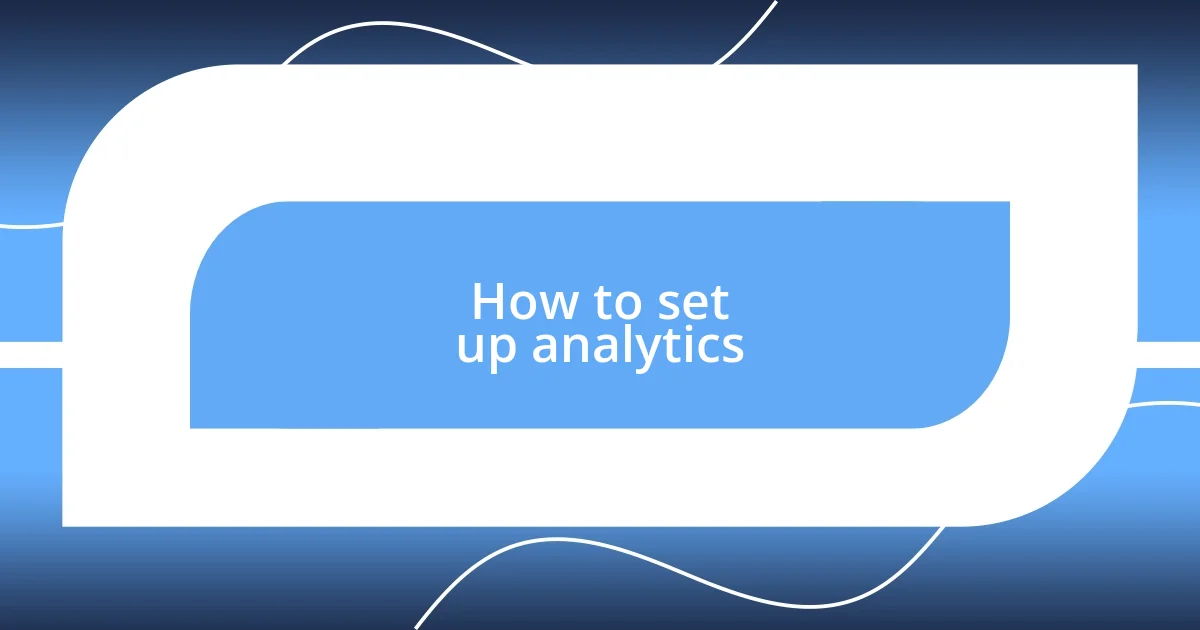
How to set up analytics
Setting up analytics for forum tools can seem daunting at first, but it’s surprisingly straightforward once you break it down. I remember feeling overwhelmed by the myriad of options available. To begin, I recommend identifying the specific metrics that matter most for your community—like user engagement or sentiment analysis—because this clarity will guide your setup process effectively.
Next, integrating the analytics tool with your forum requires careful attention to detail. When I set up my first analytics dashboard, it felt like assembling a puzzle. Each piece had to fit just right. I had to ensure that tracking pixels and tags were correctly installed on my forum platform. This part can be tricky; I learned to double-check everything. Getting it right made a substantial difference in the data I could gather. Have you ever experienced the frustration of missing data because of a simple setup error?
Once everything is in place, I found that customizing the dashboard to reflect my community’s unique needs was incredibly valuable. Initially, I used default templates, but I quickly realized that tailoring charts and graphs to highlight what truly resonated with my users brought insights to life. It’s rewarding to glance at your dashboard and see not just numbers, but a narrative of your community’s interactions. What insights could a custom setup reveal for you? I think you’ll be surprised at how much there is to discover.
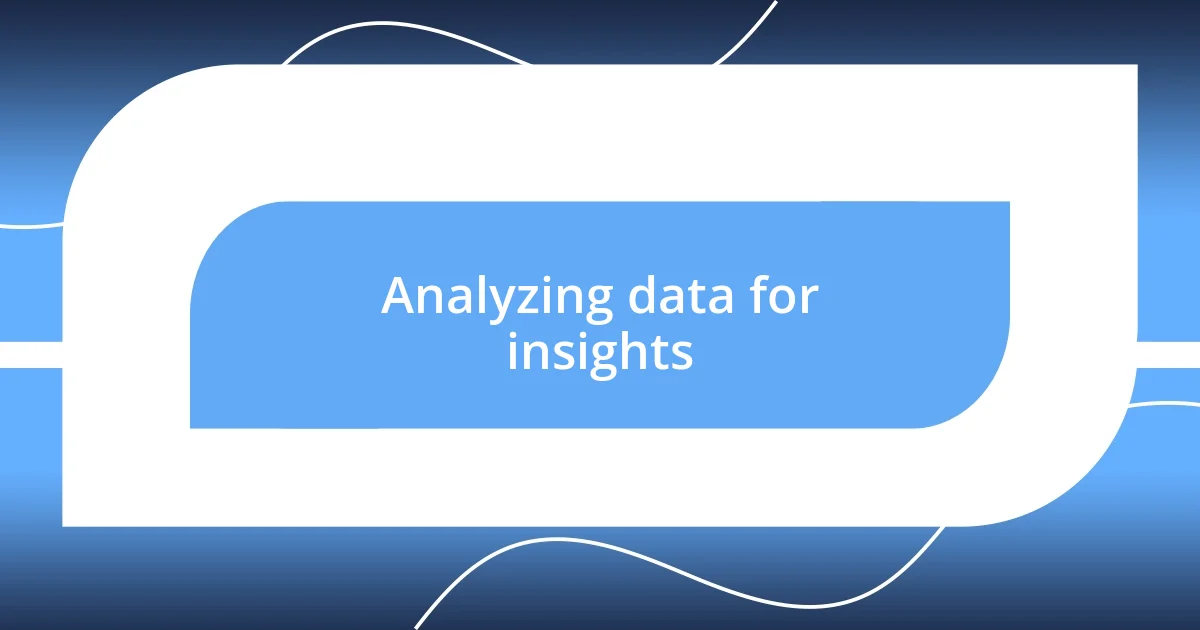
Analyzing data for insights
Analyzing data for insights goes beyond mere numbers; it’s about understanding the underlying stories behind the metrics. I remember a time when I noticed a sudden spike in forum activity related to a new technology release. This peak wasn’t just a statistic; it was a moment that signaled community enthusiasm. Diving into the data revealed specific threads that generated the most engagement. By examining these patterns, I understood not only what topics excited my audience but also how I could amplify my content to align with their interests. Have you ever experienced that “aha” moment when the data reveals not just trends, but the heartbeat of your community?
Another significant aspect of analysis is correlating different types of data to gain deeper insights. During a campaign I launched, I tracked engagement metrics alongside sentiment scores, and the juxtaposition was enlightening. While the engagement ran high, the mood was unexpectedly critical. This conflicting data pushed me to take a step back and reassess my approach. Have you ever found yourself in a situation where the numbers painted a different picture than you anticipated? It’s those moments of realization that really shape our strategies and bolster our relationships with the community.
Lastly, visualizing data can dramatically enhance insight extraction. When I began using visual reports, it became clear how powerful a simple graph or chart could be. I was amazed at how a quick glance could illuminate trends that hours of reading numbers couldn’t. One time, I created a heat map of active user sessions that showcased peak hours of community interaction. This discovery allowed me to plan posting schedules strategically, ensuring my content reached more eyes. Isn’t it fascinating how the way we present data can influence our understanding of it? When we visualize, we not only capture attention but also spark ideas that can propel our engagement even further.
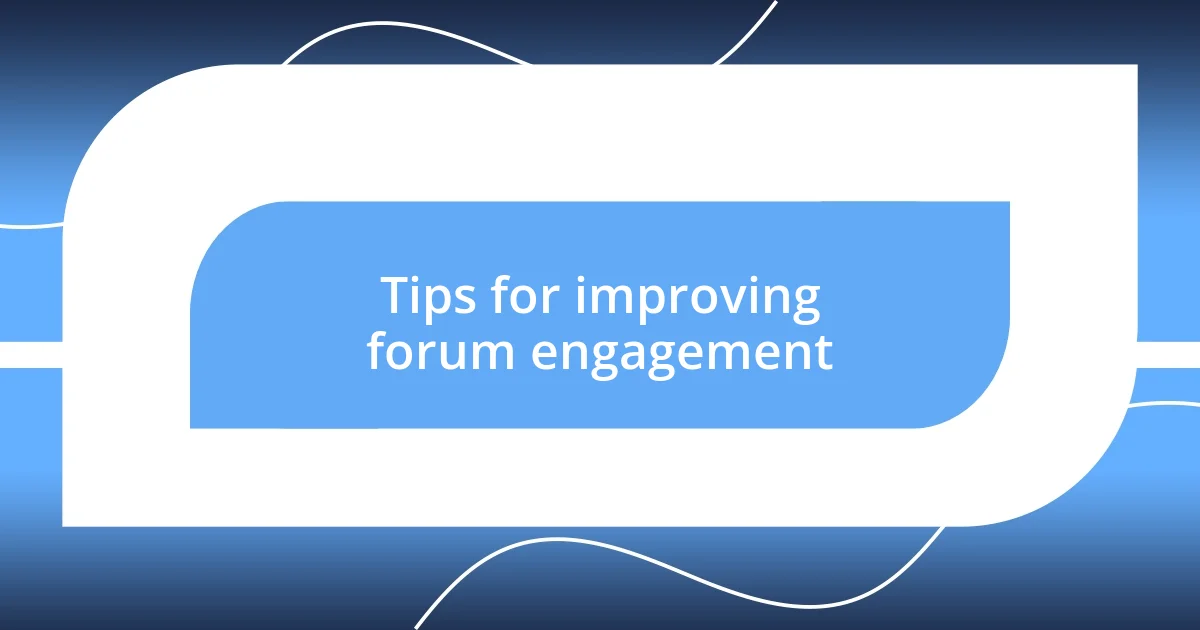
Tips for improving forum engagement
One effective way I found to improve forum engagement is by actively encouraging user participation through prompts and challenges. When I introduced a monthly discussion topic, it transformed the static nature of our conversations into lively debates. I can still remember the excitement in the air as members shared their opinions and experiences, sparking interactions that extended far beyond the initial post. Have you ever noticed how a well-placed question can ignite a flurry of responses?
Additionally, recognizing and rewarding user contributions can significantly boost engagement. I implemented a “Member of the Month” recognition, where not only did we spotlight an active user, but we also featured their favorite topics or contributions. The pride that came from this acknowledgment created an environment where others were inspired to participate more vigorously. Isn’t it fascinating how a little appreciation can create a ripple effect, motivating others to jump in and share?
Lastly, I learned the importance of being present in discussions. When forum members see that their contributions matter, it fosters a sense of community. I made it a point to respond to comments and questions, even the simpler ones. One time, I replied to a heartfelt message from a newcomer, and their gratitude showed me just how impactful my engagement could be. Don’t you think that connecting on a personal level can turn a casual visitor into a loyal community member?












